Related Research Articles

"The Fool on the Hill" is a song by the English rock band the Beatles from their 1967 EP and album Magical Mystery Tour. It was written and sung by Paul McCartney and credited to the Lennon–McCartney partnership. The lyrics describe the titular "fool", a solitary figure who is not understood by others, but is actually wise. McCartney said the idea for the song was inspired by the Dutch design collective the Fool, who derived their name from the tarot card of the same name, and possibly by Maharishi Mahesh Yogi.
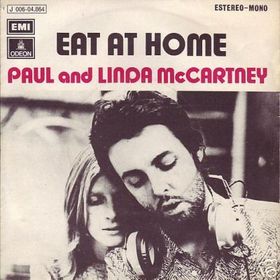
"Eat at Home" is a 1971 single by Paul and Linda McCartney that also appeared on their album Ram from the same year. The song, a standard rock number, features McCartney on lead vocals, electric guitar, bass and drums and Linda McCartney performing backing vocals.

"Give Ireland Back to the Irish" is a song by the British–American rock band Wings that was released as their debut single in February 1972. It was written by Paul McCartney and his wife Linda in response to the events of Bloody Sunday, on 30 January that year, when British troops in Northern Ireland shot dead thirteen civil rights protestors. Keen to voice their outrage at the killings, Wings recorded the track two days later at Abbey Road Studios in London. It was the band's first song to include Northern Irish guitarist Henry McCullough.

"My Love" is a song by the English–American band Paul McCartney and Wings that was first released as the lead single from their 1973 album Red Rose Speedway. It was written by Paul McCartney as a love song to his wife and Wings bandmate Linda. The single marked the first time that McCartney's name appeared in the artist credit for a Wings record. Released on 23 March 1973, the song topped the Billboard Hot 100 chart in the US for four weeks and peaked at number 9 on the UK Singles Chart. The single was viewed as Wings' first significant success in the US and helped Red Rose Speedway achieve commercial success.
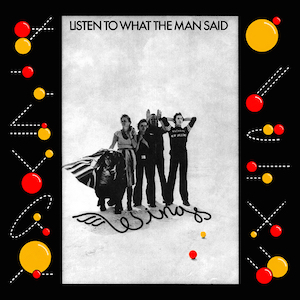
"Listen to What the Man Said" is a hit single from Wings' 1975 album Venus and Mars. The song featured new member Joe English on drums, with guest musicians Dave Mason on guitar and Tom Scott on soprano saxophone. It was a number 1 single on the Billboard Hot 100 chart in the US and reached number 1 in Canada on the RPM National Top Singles Chart. It also reached number 6 in the UK, and reached the top ten in Norway and New Zealand and the top twenty in the Netherlands. The single was certified Gold by the Recording Industry Association of America for sales of over one million copies.

"Letting Go" is a song credited to Paul and Linda McCartney and originally released by Wings on their 1975 album Venus and Mars. The song was remixed and released as a single on 4 October 1975 in the United States, and on 18 October 1975 in the United Kingdom. The song peaked at number 41 in the UK and number 39 in the US.
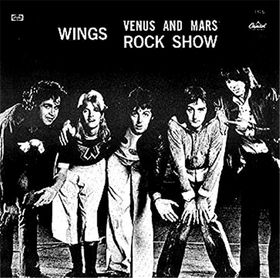
"Venus and Mars"/"Rock Show" is a medley of two songs written by Paul and Linda McCartney and originally performed by Wings that make up the first two songs of the album Venus and Mars. The single was released in the United States on 27 October 1975 and in the United Kingdom on 28 November 1975. The B-side was "Magneto and Titanium Man", another track from the album. The single version is considerably shorter than the album version of the songs; in the single "Rock Show" is cut by more than 3 minutes and "Venus and Mars" is cut by a few seconds. "Venus and Mars/Rock Show" peaked at number 12 on the Billboard Hot 100 in the US, but did not chart on the UK singles chart, the first McCartney penned single to do so. In the book The Rough Guide to the Beatles, Chris Ingham praised both songs, describing "Venus and Mars" as "atmospheric" and "Rock Show" as "barnstorming".

"London Town" is a song by the British–American rock band Wings. The title and opening track of their 1978 album London Town, it was the third of three single releases from the album, reaching No. 39 in the US, No. 43 in Canada and No. 60 in the UK. It also reached No. 17 on the Billboard Easy Listening chart in the US.

Sir James Paul McCartney is an English singer, songwriter, musician, and record and film producer who gained worldwide fame as co-lead vocalist and bassist for the Beatles. His songwriting partnership with John Lennon remains the most successful in history. After the group disbanded in 1970, he pursued a solo career and formed the band Wings with his first wife, Linda, and Denny Laine.

"Bluebird" is a song written by Paul and Linda McCartney and originally performed by the British rock band Wings, released on their 1973 album Band on the Run. According to author John Blaney, it was written during a vacation in Jamaica. However, author Vincent Benitez claims the song was written as early as 1970 or 1971, noting that Paul and Linda sang the song during a live interview in New York City in 1971. In Continental Europe it was also released as the B-side of the "Mrs. Vandebilt" single.
"Call Me Back Again" is a song credited to Paul and Linda McCartney and performed by Wings. It was originally released on the album Venus and Mars. It was performed throughout their world tours in Australia and America and a live version was included on the album Wings Over America. It was also included on the compilation album Wingspan: Hits and History. The song was also included on the theatrical version of the film Rockshow, documenting the Wings 1976 tour, but was excluded from the laserdisc version of the film.
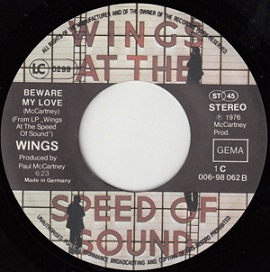
"Beware My Love" is a rock song credited to Paul and Linda McCartney that was first released on the Wings 1976 album Wings at the Speed of Sound. It was also used as the B-side of the single that included "Let 'Em In". A live version recorded on June 7, 1976, in Denver, Colorado, was included on the Wings' album Wings Over America and another live version from three days later in Seattle, Washington, was shown in the concert film Rockshow. An excerpt from the Rockshow performance was also included in the documentary Wings Over the World.

"Love in Song" is a song credited to Paul and Linda McCartney that was released on Wings' 1975 album Venus and Mars. It was also released as the B-side of Wings' number 1 single "Listen to What the Man Said." It has been covered by artists such as Helen Merrill and the Judybats.
"Must Do Something About It" is a song credited to Paul and Linda McCartney that first appeared on the Wings 1976 album Wings at the Speed of Sound.
"Little Lamb Dragonfly" is a song by Paul McCartney and Wings, credited to Paul and Linda McCartney and originally released on the 1973 album Red Rose Speedway. The song was originally recorded during the sessions for McCartney's Ram album in early 1971, and thus Hugh McCracken plays guitar on the recording rather than Wings' guitarist Denny Laine. However, Laine did provide backing vocals during the production work for Red Rose Speedway. McCartney originally intended to use the song as part of his Rupert and the Frog Song animated film project. Chip Madinger and Mark Easter noted that drummer Denny Seiwell may have assisted in writing the song, although he was not credited.
"She's My Baby" is a song credited to Paul and Linda McCartney that was first released by Wings on their 1976 album Wings at the Speed of Sound. It is a love song sung by Paul directed at Linda. Critical opinion of the song has ranged from a description as Paul McCartney's "sweetest, daftest love song" to a suggestion that it deserves an "honor for sheer awfulness." In 1998, after Linda's death, Paul McCartney rearranged the song for string quartet to be played at memorial concerts for his late wife. This version was included on the 1999 album Working Classical.
"No Words" is a song written by Paul McCartney and Denny Laine, and first released on 7 December 1973 on Band on the Run by Paul McCartney and Wings. The song was Laine's first co-writing on a Wings album and his only writing credit on Band on the Run.
"Big Barn Bed" is a song by Paul McCartney and Wings from the band's 1973 album Red Rose Speedway. The songwriting credits are attributed to Paul McCartney and Linda McCartney.

"I'm Carrying" is a song written by Paul McCartney that was first released on Wings' 1978 album London Town. It was also released as the B-side of the "London Town" single. In 2003 it was later released on the soundtrack to the film The In-Laws.
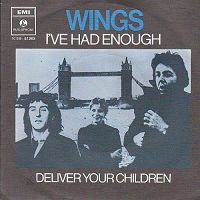
"Deliver Your Children" is a song written by Denny Laine and Paul McCartney that was first issued on Wings' 1978 album London Town. It was also released as the B-side of Wings' single "I've Had Enough". In the Netherlands, it received enough airplay to be ranked on the national charts along with its A-side, and joint single reached No. 13. On some charts within the Netherlands "Deliver Your Children" was ranked alone on the single charts, and it reached No. 9 on the Stichting Nederlandse Top 40 chart. Laine also released solo recordings of the song.
References
- 1 2 3 4 5 6 7 8 Madiger, C. & Easter, M. (2000). Eight Arms to Hold You. 44.1 Productions. pp. 215, 409–410. ISBN 0-615-11724-4.
- 1 2 3 4 5 6 7 8 9 10 11 Benitez, V.P. (2010). The Words and Music of Paul McCartney: The Solo Years. Praeger. pp. 77–78. ISBN 978-0-313-34969-0.
- 1 2 3 4 5 6 7 Blaney, J. (2007). Lennon and McCartney: together alone: a critical discography of their solo work. Jawbone Press. pp. 113–115, 244. ISBN 978-1-906002-02-2.
- 1 2 Ingham, C. (2009). The Rough Guide to the Beatles (3rd ed.). Penguin. p. 118. ISBN 978-1-4053-8445-2.
- ↑ Everett, W. (2001). The Beatles as musicians: the Quarry Men through Rubber soul. Oxford University Press. p. 137. ISBN 978-0-19-514105-4.
- 1 2 3 4 Holden, S. "Wings at the Speed of Sound". Rolling Stone Magazine . Retrieved 23 November 2011.
- ↑ White, T. (June 14, 1997). Rediscussion. Billboard Magazine. p. 87. Retrieved 23 November 2011.
- ↑ Riley, T. (2002). Tell me why: a Beatles commentary . Da Capo Press. p. 359. ISBN 978-0-306-81120-3.
- ↑ "Top Album Picks" (PDF). Billboard. April 3, 1976. p. 68. Retrieved 2020-07-16.
- ↑ Rodriguez, R. (2010). Fab Four FAQ 2.0: The Beatles' Solo Years 1970–1980. Hal Leonard. pp. 186, 216. ISBN 978-0-87930-968-8.
- ↑ Thomson, G. (2006). Complicated Shadows: The Life and Music of Elvis Costello. Canongate. p. 355. ISBN 978-1-84195-796-8.
- ↑ Ruhlmann, W. "Working Classical: Orchestral and Chamber Music by Paul McCartney". Allmusic . Retrieved 22 November 2011.